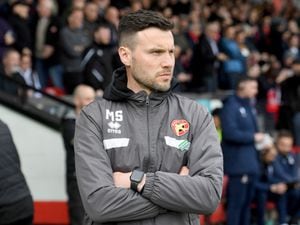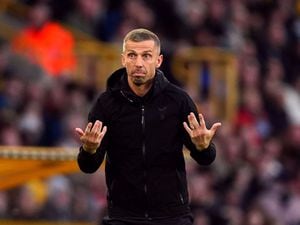Jon Purdie left wondering if he gave it his best shot
It could have been better. It could have been a whole lot worse. It might not even have got started at all.
The career of Jon Purdie was one which carried so many highlights.
He lived the dream of so many, representing England schoolboys, starting out with Arsenal, chalking up over a century of appearances for Wolves, scoring a spectacular FA Cup goal which will be rolled out as one of the competition’s giant-killing highlights from now to eternity.
But could it have been more?
Could his undoubted talent and eye for goal have seen him go higher in the game?
Play at the very top? Even represent his country, at senior level?
We will never know. And he will never know. But Purdie does find himself questioning if he gave it his best shot.
And yet sometimes, maybe personal happiness and contentment can mean more. Maybe it just wasn’t meant to be, and that turning semi-professional in his mid-20s allowed Purdie to mix careers in football and business in such a way that now, at 54, he can look back with a relaxed satisfaction in how life has ultimately panned out.
So many questions, and so many if’s, but’s and maybe’s, which is why the release of his autobiography – Purds, Booze and Footy – makes fascinating reading not just for those who follow the fortunes of Wolves, Arsenal and Kidderminster Harriers, but football fans in general.
This is a real story, of football before big money, of ups, downs and everything that lies in between, and no stone of Purdie’s tale is left unturned. Warts and all, as they say.
“It’s not a book about scoring a goal on this day or that day, or what happened in this match or that match, but more the stories behind everything,” Purdie explains.
“I just feel I have got a story to tell, right from the start and the frailties of a young boy going down to London to join Arsenal and not really knowing what to do.
“I have been working on the idea for a few years, and when lockdown came and I had more time I was able to really get my head down and get it finished.
“It’s not about making money, I’ll be happy to break even, but more about something which I can leave for my children and hopefully grandchildren after that.
“I know very little about my Grandad or Great Grandad and I just feel there is a story there and it would have been a shame not to document it.
“It was quite cathartic as well, bringing back a lot of memories, some good and some bad.
“But I hope it will be an interesting read for anyone with an interest in football, the story of what it is really like.
“Football never owed me anything and I didn’t expect anything from it, and it was a journey that I went on.
“We all have our own journeys, and our own lives, and this book is the story of how mine went.”
There is an added strand to the book’s release which will also include Q&A events at several local venues to help raise money for Breast Cancer Care.
The motivation to support that charity stems from the fact that Purdie’s ex-wife is now in remission having been diagnosed with breast cancer while his friend Jason Guy – who is organising and leading the Q&A’s – lost his former wife Lucy to the disease.
Purdie is keen to give something back, and keen to help, a reflection of where life has now taken him, including as a proud father to sons Charlie and Jack.
Work is as an Estate Planner with KingsGuard Legal Solicitors in Stourbridge arranging wills, powers of attorney, and property protection trusts for care home fees and funeral plans.
Living in Bridgnorth, he spends plenty of time looking after his parents back in his home town of Corby, as well as coaching part-time for fellow Corby Town footballing export Eddie McGoldrick for a Crystal Palace Academy based at Northampton College.
Indeed coaching helped prolong Purdie’s interest in football after his official playing days came to an end, initially helping with one of his son’s teams at Old Wulfrunians before taking the Castlecroft-based first team for a season.
More recently he spent two years picking up more football experience and more life experience coaching young players at the Samui United Academy in Thailand.
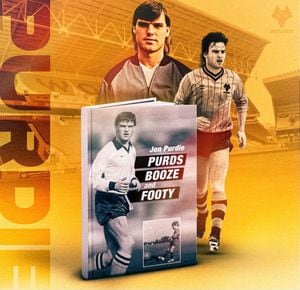
Every book, every footballing story, needs a beginning, and for Purdie that came at Nottingham Forest, where he was first snapped up as a schoolboy at the age of 12.
Leicester also showed an interest, but Forest were one of the top teams in the country at the time, not to mention double European Champions.
It was at this stage that Purdie graduated to England schoolboy honours.
Representing England – the pride, the prestige, the honour - is quite rightly hailed among the pinnacle of footballing achievements.
Just look at the last few weeks and the excitement generated around England’s run at Euro 2020.
For Purdie, with his schoolboy caps, England recognition arrived at the very start of his career rather than the summit.
And turning out for England Schoolboys was every bit the honour that he hoped and anticipated it would be.
He struck five goals in seven games, he played at Wembley and at the Olympic Stadium in Berlin, and team-mates included Michael Thomas – later a title-winner at Arsenal – and John Beresford, twice a Premier League runner-up.
Yet for all the pride and sense of achievement, impressing for England Schoolboys prompted a chain of events that propelled Purdie to become one of the most coveted young talents across the country.
Top clubs throughout the land were interested.
“If am totally honest, I was totally confused and didn’t know what to do or where to go,” Purdie recalls.
“This was something which far exceeded anything my parents had expected with my football.
“My Dad was a local fella who had played amateur football and was involved with an amateur club but to go from that to being chased by all these top clubs – well none of us had a clue.
“The England Schoolboys games had almost opened a can of worms with all that attention, as well as moving me from my preferred position as a striker out to the wing because of my size.
“Arsenal were among those interested and they invited us all down for a weekend and spoiled both me and my Mum and Dad.
“They put us in a top hotel, showed us around Highbury - which is always a special place - they took us to see the show Cats, and I travelled with the first team to a game against Brighton.
“They treated me as if I was special, and it really impressed me and so, at the age of 16, I decided to go there.”
It would, however, turn into a “nightmare” as Purdie, away from home for the first time, found it very difficult to settle.
“At 16 you think you are an adult but really you are still wet behind the ears and you don’t know anything,” he admits.
“There were no agents, I was having to make adult decisions, and I was making mistakes left, right and centre.
“At one point I actually turned down a new contract at Arsenal thinking I was getting bullied when I really should have just sucked it up and got on with it.
“It is a small world in football, people talk, and I got a reputation for being strong-minded, which I am.
“But at 17 you are not supposed to be are you? You are supposed to be grateful, and maybe I should have been.
“At the time I thought I could just move and go somewhere else and be happier but it wasn’t that easy.”
At Arsenal, Purdie had been playing alongside the likes of Charlie Nicholas, Tony Adams, Paul Merson, Thomas and David Rocastle.
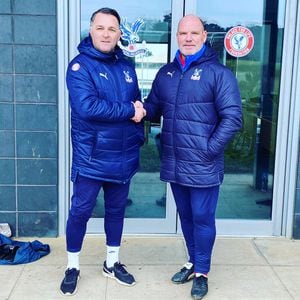
Moving from the Gunners to Wolves in 1985 was chalk and cheese, the sublime to the ridiculous, with Molineux on a momentum-gathering downward spiral on and off the pitch.
Purdie’s debut, as an 18-year-old, came in front of a crowd of 5, 576 in an away game at Brentford on the opening day of the old Third Division campaign in 1985/86.
He grabbed his first goal in the next away game, in front of a larger crowd against Derby at the Baseball Ground, and, although Wolves were relegated, Purdie showed plenty of promise under the guidance mainly of Sammy Chapman.
The following campaign, certainly the back end, stirred the seeds of revival amongst a Wolves squad which would not only so emphatically revitalise the club’s fortunes but also the mood of a city, or town as was.
Although agonisingly losing a two-legged play-off final to Aldershot, an end-of-season flourish in which Wolves won 15 and drew two of their final 19 league games was a powerful signal of what was to come.
Purdie was involved in all but two of those games, chipping in with four goals during the first throes of the Graham Turner revival.
Yet that would prove as good as it got – for Purdie at least – as Turner focused on a style more suited to the striking talents of Steve Bull and Andy Mutch, with the guile from the flanks supplied by Robbie Dennison.
Of course that was disappointing, and tough to take given how much Purdie had been enjoying life at Wolves, but he also understands it.
“I thought I did o-k for a couple of years at Wolves and then Graham came in and got the players he needed and the style he wanted to get up two levels,” says Purdie.
“I am not criticising him for that at all, you can see what happened to the team, and I’m not blaming anyone – it was just the circumstances I found myself in.
“I also think there is a part of it that when a manager brings players in then, more often than not, they are going to play.
“Sammy Chapman, Bill McGarry and Brian Little, my previous managers at Wolves, hadn’t been given any money to spend but they found a bit for Graham.
“That was unfortunate for me but very fortunate for Wolves because he bought Bully (Steve Bull), who was fantastic, Thommo (Andy Thompson), who was fantastic, and Robbie Dennison, who was fantastic and played in my position.
“If a manager signs a player and has spent money on him you know it is likely they are going to play whereas if you are ‘inherited’, then you are under more pressure in terms of being more likely to be dropped.
“That’s just football politics – not me being bitter, but if a club invests money then a manager has to justify it.
“Obviously it worked incredibly well with Wolves getting the promotions, and even though I might have been able to hang around and be involved in the old First Division when we would have played more football, in the end I decided I was going around in circles and just felt I needed to do something else.”
In all, Purdie chalked up 103 appearances for Wolves, scoring 13 goals, departing after the Sherpa Van Trophy success of 1988 in which he was not involved due to being cup-tied from a loan spell with Cambridge United.
The facts and figures however tell only part of the story of Wolves from that time.
The closure of two sides of the ground, the decaying of the facilities and cockroaches in the dressing room were far cry from the luxurious marble halls of Highbury which Purdie had previously been accustomed to.
What it also did was manufacture and maintain an incredibly tight spirit between the players, including the much famed ‘Tuesday Club’ of all day ‘socialising’ after training as well the now infamous Friday sessions on the car park.
All of this forms another hugely entertaining part of ‘Purds, Booze and Footy’.
“You could say there was certainly a marked difference between Highbury and Molineux in those days,” Purdie recalls with a smile.
“The club was in a bit of a state and there are all of those stories from that time.
“There was the ‘Tuesday Club’, where we would have a really hard training session and then go off and have a few drinks and a bit of fun.
“And the car park on a Friday started literally because we had nowhere else to train, and we did it once and won the day after so it just carried on.
“It was all a bit of banter really, you never do a great deal of training the day before a game, although I suppose someone could have broken an ankle and my knees aren’t so happy about it now!
“I used to have to go off after that to the Cash & Carry to get the drinks to run the Players’ Bar on the Saturday because the club couldn’t afford to set anything up themselves.
“We didn’t have much, but we had a great group of players and we gelled and bonded, and when you keep on winning games there is no better feeling.”
Purdie had made his mind up however that, after coming out of Wolves, and ‘drifting around football’ for a time, the life of a journeyman was not for him and chose instead to turn to the semi-professional side of the game to combine his passion with a career in sales.
But there was still one high profile day to come, a day when Purdie offered a deadly reminder of his unquestionable ability.
The FA Cup Third Round of January, 1994. Kidderminster Harriers of the Conference, including Purdie, travelling the short distance to face Birmingham City, in the equivalent of the Championship.
Purdie’s previous FA Cup experience had seen him, by his own admission, ‘freeze’, as the lone forward for Oxford against a Manchester United defence of Steve Bruce and Paul McGrath in a 4-0 defeat at Old Trafford.
This time he vowed it would be different, and so it was, Purdie dropping his shoulder some 30 yards out, cutting inside and hitting a sumptuous strike beyond Ian Bennett for what would prove the winner in an historic 2-1 victory.
“That goal was obviously memorable for me, but it was absolutely about the team – we had such a good team at Kidderminster that year,” Purdie recalls.
“I am a great believer in a football team being like a jigsaw, with all the different players being pieces who all have to do their own bit to make it all work.
“Not everyone has to run up and down and kick people, or tackle and head it, and if you get the right people in the right positions with the right balance then you get results.
“That is what Graham Allner (manager) did at Kidderminster - we had lads who were solid and could defend, lads who could use their skill, and it all gelled.
“Even when we lost to West Ham in the fifth round of the cup, who were in the Premier League, it was only 1-0 and there was nothing in it, and we would go on and win the league only to not be allowed promotion due to the capacity of the stadium.
“We were a good team with good players, some of whom had played in the league and others who went on to afterwards, and we certainly never feared anyone.”
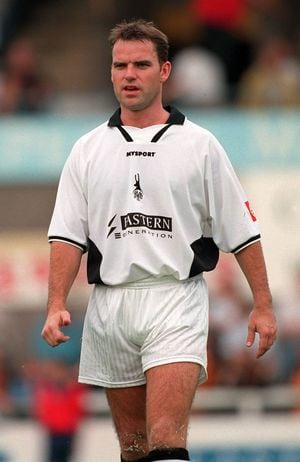
That goal was evidence as to the abilities that Purdie possessed, and takes us back to all those questions about what might have been.
What would have happened if he had enjoyed more support at Arsenal? If teams perhaps played a more technical style as they do now? If players of Purdie’s skill had been given the sort of protection they do in the modern game?
The essence of a book is almost automatically to look back and reflect, and this one is no different, but Purdie does so, and discusses all of those questions, with very few regrets.
“I do look back and wonder what would have happened if I had stayed at Forest and Cloughie (Brian Clough) had got hold of me,” Purdie admits.
“And football is played more on the floor these days which would have suited me.
“In my time you knew it was a free-for-all in the first 20 minutes and the full back would be flying in and I became very good at hurdling those challenges.
“I wasn’t the bravest or the toughest but I was able to look after myself and certainly wasn’t as soft as some you see rolling around from the slightest touch these days.
“Young players are also looked after much better now with the way football has progressed.
“I left home at 16 to join Arsenal and it was sink or swim with nobody really knowing what I was doing after finishing training at 1pm until turning up again at 9am the next day.
“In that respect I wasn’t the only one, and there were other lads who were outstanding footballers who were lost to the game.
“Nowadays, with the additional money involved, young players are seen as assets, and clubs will look after them accordingly with much better player care.
“But I don’t look back with any bitterness on that, times change, and football changes, and always will do.
“At the same time football has never defined me, I never thought I was anything special just because I could kick a bag of wind around a bit better than other people.
“I am 54 now and do feel blessed and lucky - over the last year or 18 months with everything that has happened it has made me realise how fortunate I am.
“There were players and team-mates who were far more successful than me in their football careers, but have struggled when it all finished, and that is where I was lucky to have already found something else I could do to be able to move on.
“I didn’t have to hang onto football and having been involved in business work since my mid-20’s I have that confidence in life that I am going to be o-k.”
As a Wolves ‘centurion’, Purdie is part of a select band who lived that Molineux dream, something he admits he has only really properly appreciated since going to watch games with lifelong devotees in more recent times.
“It felt like it was just normal to me at the time but it is only when going along to games now with Wolves fans and seeing the passion they have that I realise how much it really means,” adds Purdie, who still turns out for Wolves Allstars.
“But I loved playing for Wolves.
“Moving from London, which is sometimes not the friendliest and a bit dog-eat-dog, I found the people in Wolverhampton so friendly and I’m a social animal so have got to know many over the years.
“I lived in Wolverhampton for 30 years or so, and am not far away now, so I have got a lot of friends who are Wolves fans and affection for the area.
“There are plenty of ups and downs included from my time at Wolves in the book, but it’s not all heavy stuff, and there are a fair few funny stories in there too.
“There are stories around Andy King, who was there when I arrived and is a real character, and Micky Holmes, my best pal at Wolves who can’t help being funny even if he doesn’t mean to be half the time.
“I made loads of mistakes in my career, did daft things, and there are a fair few of those included as well!”
It was certainly a rollercoaster career, a real life career, which begs one final question when taking a step back in time: ‘What would Jon Purdie, the successful 54-year-old businessman, say to Jon Purdie, the 12-year-old aspiring footballer, were he ever to get the chance?’
“Just give it your best shot, that’s what I’d say,” comes the reply.
“I didn’t, and that is the main thing I regret.
“I enjoyed life, and probably wasn’t dedicated enough, but maybe that’s my character which would have been difficult to change?
“But it would be nice now to look in the mirror and say I gave it my best shot, and I’m not sure I can do that.
“So yes that’s the regret, but whatever happened to me, it wasn’t life defining, it didn’t finish me off.
“All of us, we go through ups and downs, and I have had the downs like so many people and have had real struggles at times.
“It’s all about keeping going, and bouncing back, and I am proud that I have come through it and feel that I am now thriving again.”
Could have been better, could have been worse.
But surely better to have loved and lost than never to have loved at all.
Purdie enjoyed a glimpse of the high life in football, and remains fondly remembered by Wolves fans in particular, even if things didn’t ultimately develop at Molineux as ideally he would have wanted.
And now, you can read all about it.
· Purds, Booze and Footy retails at £10 (not including postage and packing) and can be purchased at www.jonpurdie.co.uk as well as during several events following a launch at the Leaping Wolf on Monday, July 26th(7pm). Keep an eye on Twitter @jonpurdie for more details or email jp@kingsguardlegal.co.uk

